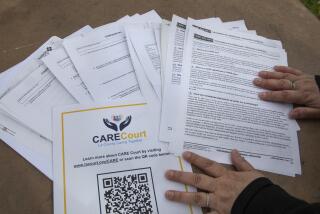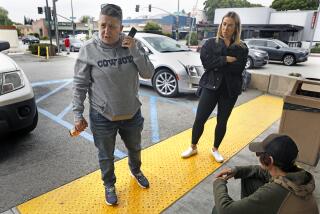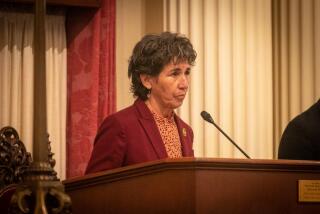Woman Tells House Panel of Rescue From Mental Hospital
- Share via
WASHINGTON — A 39-year-old Minnesota woman said Friday that she would either “be a vegetable or be dead” if she had not been rescued from a state mental hospital by an outsider who learned about her bizarre tale.
Judy Cordie, who said she has hired a lawyer to pursue legal recourse, appeared before the House health subcommittee in support of a measure designed to protect the civil liberties of Americans in mental hospitals.
“The seriously mentally ill are often unable to protect themselves from even the most severe abuses,” said Rep. Henry A. Waxman (D-Los Angeles), the subcommittee chairman.
Third-Party Advocates
A proposal by Waxman, similar to one that passed the Senate on Wednesday, calls for the federal government to provide states with money to hire third-party advocates for the mentally ill.
Those advocates would have the authority to investigate incidents of abuse and pursue legal remedies on behalf of the estimated 159,000 people now in mental hospitals.
In her testimony, Cordie said she and her husband, Gary, first ran into trouble in their hometown of Fergus Falls, Minn., when they refused to send Gary Cordie’s 9-year-old daughter by a previous marriage to school. Instead, the girl was taught at home.
Cordie, who described herself as a strict Christian, said her stepdaughter, LeAnn, was taken away by local welfare officials on April 1, 1984.
Three months later, she said, she and her husband were arrested by local authorities and sent to a state mental hospital on grounds they suffered from “delusional religious beliefs.”
‘Target of Abuse’
Once in the mental hospital, Mrs. Cordie said, she and her husband “were the target of abuse.”
Cordie said she was finally able to win her freedom when a lay advocate for the private Mental Health Assn. of Minnesota, Bill Johnson, learned about her case and intervened. She and her husband were released Nov. 20, 1984.
Johnson called Cordie’s case “one of the worst abuses of civil rights” that he had ever seen. He said, however, that a Minnesota court of appeals held that the involuntary commitment of Cordie and her husband was proper.
John Clawson, head of the mental hospitals division of the Minnesota Department of Human Services, said the appeals court decision “ended the litigation” on Cordie’s case.
More to Read
Sign up for Essential California
The most important California stories and recommendations in your inbox every morning.
You may occasionally receive promotional content from the Los Angeles Times.













